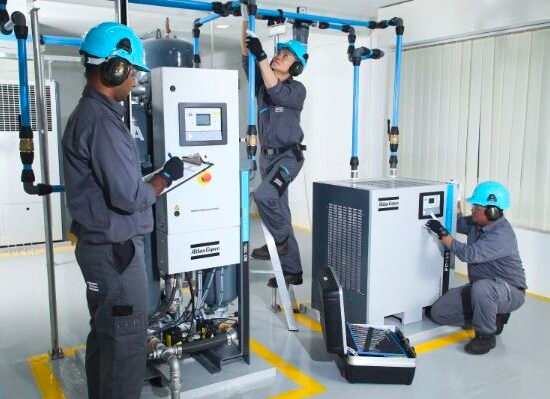
If you don’t have enough room on your premises for your air compressor installations, you may be wondering if you can install an air compressor outside.
This is possible, however there are specific considerations that must be taken into account. Here are some requirements you must meet in order for your air compressor to work efficiently and reduce the risk of any damage to your equipment.
Requirements for Air Compressor Installations Outside
Adequate Shelter
Make sure to install your air compressor under a roof or a shelter of some sort. This will add protection against rain and snow, especially for air intake openings, suction inlets and ventilation mechanisms. It’s important to try and avoid any wet weather elements getting inside the compressed air system and avoid damage the exterior due to extreme weather.
Can You Use An Air Compressor In The Rain?
Protecting your air compressor from moisture is crucial to the longevity of your system. If you have to install an air compressor outside, make sure it’s protected from the rain with either a waterproof shelter, roof or a waterproof tarp.
Make sure to check your compressor regularly to ensure it is still working efficiently after wet weather. If there is extreme heavy rain or storm conditions predicted, it may be best to stop operations until the weather clears.
Stable Foundation
A solid, flat foundation is also vital for your air compressor when installing it outside. Whether it’s asphalt, concrete slab or a flattened bed of shingle, the air compressor must be sitting perfectly horizontal and on a foundation that has sufficient weight capacity. Remember to also introduce vibration-dampening features to reduce any movements during operation.
Air Filters
Air compressor installations outside will be more susceptible to dust, inflammable and corrosive substance exposure. Dirt particles that cause wear and corrosive gases can be damaging to both the equipment and to the compressed air production. It is recommended that a pre-filter is installed where there is a high dust concentration but be aware of the pressure drop this may cause.
Will an Air Compressor Work in Cold Weather?
During the Autumn and Winter seasons, the temperature starts to drop to its lowest. Although cold air is less likely to affect your air compressor due to its low moisture content, your air compressor should not be exposed to cold weather for long periods of time.
Air compressor installations outside make this difficult to avoid, however there are some tips for looking after your air compressor in the cold weather. Add insulation or install a heat trace system around the piping to keep the inside of the compressor from getting too cold.
Check your air compressor daily to ensure there is no moisture or ice build-up, especially around the pipes and the air filters. If you do not have an auto drain valve, remember to manually drain the condensate every day to avoid freezing.
At what temperature does an air compressor stop working?
If the temperature drops below 5°C, your air compressor won’t necessarily stop working, but this is when problems may start to occur. Ideally, air compressors have been designed to effectively operate between 5°C and 35°C.
Where is the Best Place to Install an Air Compressor?
The best place to install an air compressor is inside and, ideally, in its own compressor room. If you only have space for it in a shared space, it’s important it has more than enough room surrounding it with plenty of ventilation. It must also be healthy and safety compliant.
Or, if you require air compressor installations outside, this is still possible too and Air Power East are here help. Remember, we offer air compressor servicing, maintenance and installation. Contact us directly to find out what we can do for you.







